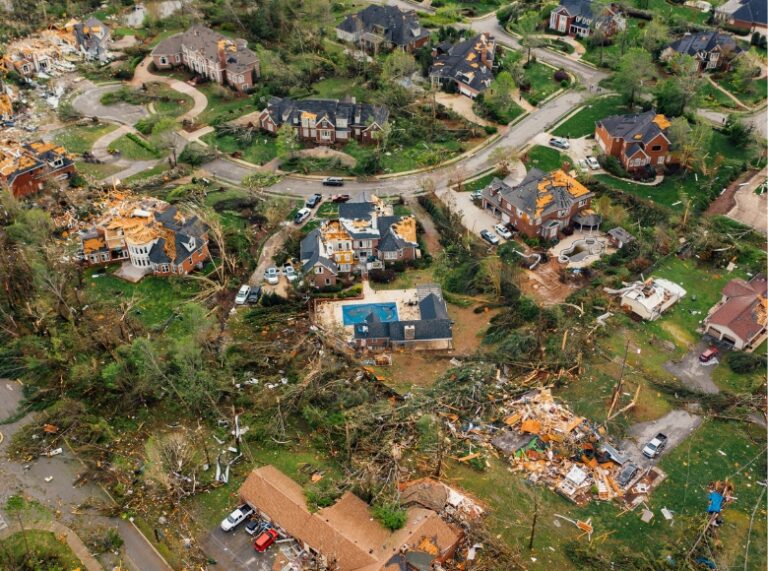When disaster strikes, whether it’s a sudden storm, a fire outbreak, or flash flooding, the top priority becomes safely restoring business operations. Amid the initial chaos of a disaster, filing an insurance claim often feels overwhelming. Documents must be gathered, damages recorded, and proof-of-loss forms submitted; property managers are led to believe that by taking these steps, they can ensure a fair settlement. But behind the scenes, insurers frequently use subtle tactics to reduce payouts, often leaving policyholders undercompensated and frustrated.
Understanding these tactics is the first step toward optimizing a claim. By recognizing what to watch for, it becomes easier to gather stronger evidence, challenge unfair deductions, and negotiate with confidence. Below are the five most common methods insurers use to undervalue property claims.
1. Low‑Ball Initial Offers
Insurers often present a preliminary estimate that is significantly lower than the actual loss. This tactic relies on the psychological “anchor effect,” where the first number discussed influences all subsequent negotiations. Once the initial check is accepted, the total recovery is effectively capped.
A public adjuster counters this by:
- Reviewing and recalculating the scope of repairs using up‑to‑date local cost data
- Obtaining multiple competitive contractor bids to prove real replacement costs
With a solid, data‑backed counter‑estimate, insurers are forced to justify every deduction rather than relying on acceptance of a quick, low payment.
2. Overlooking Hidden or Secondary Damage
When inspections are limited to visible damage, important issues are often excluded, such as water seeping under flooring, mold growth after a flood, or structural weakening behind walls. These secondary losses can amount to tens or even hundreds of thousands of dollars if left undocumented.
To capture all hidden damage, a thorough early inspection should:
- Use moisture meters and thermal imaging to detect concealed water intrusion
- Engage specialists for mold assessments
- Include structural engineer reports for integrity concerns
By documenting these items upfront, no valid loss goes unclaimed.
3. Excessive Depreciation Calculations
Insurers calculate actual cash value (ACV) by subtracting depreciation, often applying steep rates on older items even if they were well maintained or recently upgraded. This practice can significantly reduce payouts, despite recent investments in maintenance or repairs.
Excessive depreciation can be disputed by:
- Providing purchase receipts and invoices for recent upgrades
- Presenting independent appraisals that reflect current replacement costs
- Arguing for replacement‑cost coverage when policy language permits
With these documents, insurers must honor the true value of damaged property instead of relying on generic age‑based schedules.
4. Narrow Business Income Scope
Commercial claims include both lost revenue and extra expenses, but some insurers limit coverage to basic sales losses. They may ignore costs such as rent for temporary facilities, overtime wages, or marketing expenses needed to regain customers resulting in a settlement that fails to cover the full interruption impact.
A well‑prepared business‑income claim will:
- Compare profit and loss statements before and after the event
- Itemize extra expenses like leased equipment, staffing costs, and expedited shipments
This comprehensive package leaves insurers little room to dispute valid business interruption and associated expenses.
5. Excluding Code Upgrade Requirements
Building and safety codes evolve over time. After a loss, local regulations may require rebuilding to current standards. Insurers sometimes reject these costs as “betterment,” claiming they’re not covered under replacement‑cost policies.
To include mandatory upgrades in the claim, steps should include:
- Obtaining official code language from the local building authority
- Getting contractor estimates that separate code‑related work costs
- Including expert testimony explaining why upgrades are legally necessary
A detailed “ordinance and law” claim ensures coverage for compliance expenses rather than shifting them onto property owners.
Expert Documentation & Negotiation
Facing insurer tactics without support can leave critical gaps in the claim. Public adjusters help level the playing field by acting as advocates from day one. Key steps include:
- Immediate Evidence Gathering: Capturing photos, videos, and logs before evidence degrades
- Specialist Engagement: Bringing in engineers, accountants, and environmental experts to support hidden or complex losses
- Market‑Based Cost Data: Using multiple bids and local rate guides to prove true replacement costs
- Policy‐Language Review: Identifying all relevant coverages, extra expense, ordinance and law, and extended replacement cost
- Comprehensive Proof‐of‐Loss: Submitting one complete packet rather than piecemeal responses, reducing delays and back‑and‑forth
With each undervaluation method addressed, insurers must contend with a robust, evidence‑driven claim or face formal dispute processes like appraisal or mediation.
Why Continental Adjusters Is the Best Ally
Full recovery should never be compromised, and navigating insurer tactics doesn’t have to happen alone. At Continental Adjusters:
- Mobilize Fast: On‑site within 48 hours to preserve evidence and set the claim’s narrative
- Apply Deep Expertise: The team includes licensed adjusters, forensic accountants, engineers, and expert witnesses
- Negotiate Aggressively: Challenging every low‑ball offer, depreciation schedule, and exclusion with data and professional reports
- Serve Nationwide: Licensed in over 40 states and handling international claims since 1999
Don’t let undervaluation tactics determine the outcome. Reach out to Continental Adjusters for a free consultation and recover every dollar entitled under policy terms.
FAQ
Q. How do I know if my property insurance claim is undervalued?
– If the settlement offer seems too low to cover necessary repairs or replacements, or if damages were overlooked, your claim may be undervalued. A professional claim review can confirm this.
Q. Can I dispute my insurer’s settlement offer?
– Yes, you can challenge the offer by providing additional documentation, expert assessments, or hiring a public adjuster to negotiate on your behalf.
Q. Do public adjusters work for residential and commercial claims?
– Yes, public adjusters handle both residential and commercial property claims, representing the policyholder’s interests.
Q. What’s the difference between actual cash value and replacement cost?
– Actual cash value covers the depreciated value of your property, while replacement cost pays the full amount to replace it with new materials of similar kind and quality.



